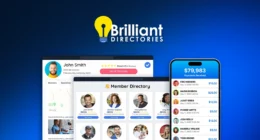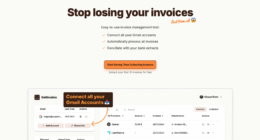The top CRM marketing software solutions combine powerful features with user-friendly interfaces. Salesforce leads enterprise solutions with extensive customization, while HubSpot excels for small to medium businesses. Zoho CRM offers budget-friendly options, and Monday CRM specializes in visual workflow management. Key factors include automation capabilities, multi-channel integration, and mobile accessibility. Choosing the right platform depends on specific business needs, team size, and budget – factors that deserve careful consideration to maximize return on investment.
Quick Overview
- Salesforce leads enterprise CRM solutions with advanced customization options and comprehensive analytics tools for large-scale business operations.
- HubSpot provides intuitive marketing automation and CRM features specifically designed for small to medium-sized businesses.
- Zoho CRM delivers affordable yet powerful features, making it an excellent choice for companies with budget constraints.
- Monday CRM excels in visual workflow management and team collaboration features with user-friendly interface design.
- Workbooks offers competitive pricing through its Shared Success program while maintaining professional-grade CRM capabilities.
What Makes CRM Marketing Software Essential for Business Growth

In today’s digital marketplace, CRM marketing software stands as a fundamental pillar for sustainable business growth and success. This powerful tool delivers essential capabilities that transform how businesses operate and engage with customers.
CRM software streamlines operations by automating routine tasks and centralizing customer data, enabling teams to make informed decisions quickly. It provides deep insights into customer behavior and preferences, helping businesses identify valuable opportunities and optimize their marketing strategies. The integration of data-driven techniques helps companies create highly targeted campaigns that resonate with specific customer segments. With features that enhance customer engagement through personalized interactions and proactive support, companies can build stronger relationships and boost retention rates.
The financial impact is significant, with CRM solutions delivering an impressive $8.41 return for every dollar invested. By shortening sales cycles, improving conversion rates, and facilitating cross-departmental collaboration, CRM software creates a foundation for scalable, sustainable growth.
Top Features That Define Exceptional CRM Platforms
Exceptional CRM platforms distinguish themselves through a core set of powerful features that drive business success. Modern CRM solutions combine sophisticated analytics, seamless automation, and multi-channel capabilities to transform how businesses connect with customers and manage operations. Customer data management ensures comprehensive records of interactions and preferences through single source of truth data unification.
Modern CRM platforms revolutionize business operations with powerful analytics, automation, and multi-channel tools that elevate customer relationships to new heights.
- Advanced analytics and reporting tools provide real-time insights through customizable dashboards, helping teams track performance metrics and forecast trends with predictive analytics
- Automation features streamline workflows by handling repetitive tasks, from email follow-ups to lead scoring, while reducing human error and increasing efficiency
- Multi-channel communication integration guarantees consistent messaging across all platforms, tracking customer interactions in one central location while enabling teams to manage relationships effectively through email, social media, and calls
CRM platforms also offer mobile accessibility and customization options, allowing businesses to tailor the software to their specific needs while maintaining productivity on-the-go.
Comprehensive Review of Leading CRM Marketing Solutions

Leading CRM marketing solutions offer distinct advantages and features that cater to diverse business needs and objectives. Top platforms like Salesforce and HubSpot deliver robust functionality, while alternatives such as Zoho CRM and Monday CRM provide cost-effective options with competitive features. Each solution brings unique strengths to the table, from advanced AI capabilities to specialized industry tools. Modern platforms emphasize omnichannel routing capabilities to enhance customer interactions across multiple touchpoints.
| Platform | Key Strength | Best For |
|---|---|---|
| Salesforce | Advanced customization | Enterprise businesses |
| HubSpot | Marketing automation | Small-medium companies |
| Zoho CRM | Cost-effectiveness | Budget-conscious firms |
| Monday CRM | Visual workflow management | Collaborative teams |
These platforms excel in different areas, from Salesforce’s enterprise-grade capabilities to HubSpot’s user-friendly marketing tools. Workbooks stands out with its Shared Success program, while Zoho CRM offers strong integration within its ecosystem.
How to Choose the Right CRM Software for Your Budget
Selecting the right CRM software requires careful consideration of both business requirements and financial constraints. Companies must evaluate their needs, budget limitations, and future growth plans to make an informed decision that delivers long-term value.
- Begin by evaluating essential business requirements, including the number of users, required features, and integration needs. This appraisal helps create a realistic budget that accounts for licensing, implementation, and training costs. Choosing open-source technologies can significantly reduce development and operational expenses while maintaining system quality.
- Research and compare vendors that match your criteria, focusing on those offering scalable solutions within budget. Request demos to test compatibility and negotiate pricing based on must-have features.
- Plan implementation carefully, considering both immediate and long-term expenses. Include contingency funds for unexpected costs, and allocate resources for thorough training to guarantee effective adoption across the organization.
Maximizing ROI Through Strategic CRM Implementation

Successfully maximizing ROI from CRM implementation requires a strategic, well-planned approach that addresses key operational areas within an organization. Organizations can achieve significant returns through exhaustive onboarding programs, automation of routine tasks, and strategic system integration. Companies implementing effective CRM strategies can see up to 245% return on investment.
Strategic CRM implementation, supported by thorough onboarding and smart automation, delivers maximum ROI across organizational operations.
Key elements for maximizing CRM ROI include:
- Detailed user training and ongoing support to boost adoption rates
- Implementation of automated workflows for data entry and follow-ups
- Integration with existing business systems like ERP and marketing platforms
- Regular monitoring of KPIs and performance metrics
- Continuous improvement through feedback and refresher training
When properly executed, these strategies can lead to measurable improvements, including a 16% increase in ROI through organization-wide usage. Regular assessment of metrics like Customer Lifetime Value and Deal Conversion Rates helps confirm that the CRM system delivers the best possible value.
Frequently Asked Questions
How Long Does It Typically Take to Fully Implement a CRM System?
The implementation time for a CRM system typically varies based on organization size and complexity. Small businesses can complete the process in 1-3 months, while larger enterprises may need 6-12 months.
The timeline includes key phases: planning (2-4 weeks), vendor selection (4-6 weeks), data migration (8-12 weeks), and testing/rollout (4-8 weeks). Factors like customization needs, existing systems, and user training requirements can substantially impact the overall duration.
Can Different CRM Platforms Seamlessly Share Data With Each Other?
Like puzzle pieces from different sets, different CRM platforms don’t naturally fit together seamlessly. Data sharing between CRMs is possible, but it typically requires specialized middleware solutions or APIs to bridge the gaps. Common challenges include varying data models, security concerns, and compatibility issues.
However, modern integration tools and standardized protocols have made the process more manageable, though businesses should expect some technical complexity and resource investment to achieve smooth data exchange.
What Security Measures Protect Customer Data Stored in Cloud-Based CRM Systems?
Cloud-based CRM systems employ multiple layers of security to protect customer data. These include strong data encryption both in transit and at rest using protocols like SSL/TLS and AES-256. Multi-factor authentication and role-based access controls restrict system entry to authorized users only.
Regular security audits, compliance assessments, and employee training programs further strengthen data protection. Additionally, automated monitoring systems detect and respond to potential security threats in real-time.
How Often Should Companies Upgrade or Switch Their CRM Software?
While some companies cling to outdated CRM systems like a security blanket, regular evaluation is vital. Companies should assess their CRM systems annually, but actual upgrades typically occur every 3-5 years.
Key triggers for upgrades include business growth, technological gaps, declining performance, or user frustration. However, the timing depends on factors like industry changes, company size, and budget constraints. Proactive monitoring helps identify the right moment for an upgrade before systems become obsolete.
Does CRM Software Require Dedicated IT Staff for Maintenance?
Most CRM software doesn’t require dedicated IT staff for basic maintenance, especially with modern cloud-based solutions. While technical expertise can be beneficial for complex customizations or integrations, many CRM platforms offer user-friendly interfaces and automated updates.
Companies can effectively maintain their CRM through vendor support services, regular staff training, and occasional consultation with external IT experts. However, larger organizations with sophisticated CRM setups may benefit from having in-house IT support.
Conclusion
Like a skilled conductor orchestrating a symphony, the right CRM marketing software harmonizes customer relationships, sales processes, and marketing efforts into a powerful business growth engine. By carefully evaluating features, costs, and implementation requirements, companies can select a CRM solution that aligns with their unique needs. When properly deployed and utilized, these platforms deliver measurable ROI through improved customer engagement, streamlined operations, and data-driven decision-making.








